教育哲学educational philosophy
教育的哲学论

教育的哲学论赵一豪*(厦门大学人文学院厦门361005)摘要:悠悠万事,一切前提皆在文化之开创,而文化之开创,皆赖教育之振兴,而后可有人文生长繁荣之土壤,养育智慧德化之果实。
教育之意义,不惟有形而上的教化正道的意义在,亦有形而下的人才之培养、资政之源泉的现实实践意义在。
而欲通教育之道义,正其理而弘其业,必先开通教育之道义根基。
关键词:教育;道义;意义O n Educational PhilosophyZHAO Yihao(Humanity College of Xiamen University,Xiamen361005,China)Abstract:The most important section is the creation of culture.The basic of the creation of culture is the prosperity of education and art.The fruit of wisdom comes fromthe oil of prosperity of education and art.Education has two holy meaning:the one is su-per meaning of metaphysics;the other is worldly value of state administration and societydevelopment.Before we raise the education,we must research the philosophy of educa-tion.Key words:education;morality and justice;meaning中图分类号:B01文献标识码:A文章编号:C N53-1203/C(2012)1-0002教育者,国之大事,不可不察。
教育学名词(二)全国科学技术名词审定委员会

教育学名词(二)全国科学技术名词审定委员会作者:来源:《中国科技术语》2013年第01期教育潜力 educational potentiality 尚未被利用或尚未被充分利用的以人、财、物为表现形式的各种潜在教育资源。
教育改革 educational reform 为解决教育与社会或个人发展不相适应的部分或环节,使教育得以自我完善或持续存在和发展而对教育的体制、内容、方法等进行的改善与更新。
教育传统 educational tradition 历史地形成的、为整个社群或国家所认同、共享并世代相传的教育观念、教育制度、教育内容、教育方法等的总称。
教育变迁 educational change 在某一较长历史时段中教育的发展与变化。
教育民主 educational democracy 政治民主理念在教育中的引申。
强调教育过程应以自由、平等、参与、协商、交流、沟通、共识等为价值基础的观念、诉求、制度安排与具体实践。
教育民主化 democratization of educational system 以民主精神改造教育、重建学校秩序的教育思潮或行动。
教育现代化 modernization of education 社会现代化过程中发生的教育变化。
是在教育思想、教育制度、教育内容、教育方法、教育条件等方面逐步与现代社会相适应的历史进程,也是教育的现代性形成和丰富的过程。
教育世俗化 secularization of education 发生于普及教育初期的欧美国家,为发挥国家影响、推行教育普及而使教育与宗教相分离,教育权从教会向国家转移的历史进程。
教育先行 education as a priority for national development 教育发展领先于经济发展的政策理念和政策安排。
主要体现为:教育发展的速度应超越经济发展的速度;教育应以未来经济发展的需要为依据培养人才。
人的全面发展 allrounded development (1)人的身心的充分、和谐发展。
教育方面的英语词汇【优秀3篇】

教育方面的英语词汇【优秀3篇】(经典版)编制人:__________________审核人:__________________审批人:__________________编制单位:__________________编制时间:____年____月____日序言下载提示:该文档是本店铺精心编制而成的,希望大家下载后,能够帮助大家解决实际问题。
文档下载后可定制修改,请根据实际需要进行调整和使用,谢谢!并且,本店铺为大家提供各种类型的经典范文,如工作资料、求职资料、报告大全、方案大全、合同协议、条据文书、教学资料、教案设计、作文大全、其他范文等等,想了解不同范文格式和写法,敬请关注!Download tips: This document is carefully compiled by this editor.I hope that after you download it, it can help you solve practical problems. The document can be customized and modified after downloading, please adjust and use it according to actual needs, thank you!In addition, this shop provides you with various types of classic model essays, such as work materials, job search materials, report encyclopedia, scheme encyclopedia, contract agreements, documents, teaching materials, teaching plan design, composition encyclopedia, other model essays, etc. if you want to understand different model essay formats and writing methods, please pay attention!教育方面的英语词汇【优秀3篇】英语的学习,词汇量的。
教育哲学(PhilosophyofEducation)的涵义

教育哲学(Philosophy of Education)的涵义教育哲学是应用哲学思考,对教育的语言和基本概念加以澄清,或对教育的现象、问题或预设作通全而深入的探索、反省、描述及检证;最後形成教育理论,如教育的基本原理、教育的本质、教育的规范和理想等。
教育哲学主要分为四种取向:首先是「教育原理」(principles of education)的取向。
传统认为哲学家的角色是「爱智者」(the lover of wisdom),因此,这种模式的拥护者,经常将所谓的教育哲学呈现为关於教育的智慧,即教育原理。
教育哲学家的任务在於阐明价值是什麽,而不是探讨价值判断的意义与辩解(meaning and justification)的哲学问题。
所以他们主要是藉由思辨来建立规范性的教育原理。
虽然哲学家可以辨别形成某一原理的经验事实与道德判断,但哲学家却不能权威地宣称这类的原理。
因为原理是语言的混合体,包括概括的复杂经验和价值,其中经验部分不是哲学家所能以权威决定的。
更应注意提供证据和论证,以澄清、修正和改进这类的原理。
其次是教育理念史(history of educational ideas)的取向。
这种模式是将教育哲学视为各大教育思想家理论的介绍,也就是传授历史上伟大教育家所讨论与主张的理念,尝试将他们的着作应用到当代的教育问题上,以找出适当的答案。
但是,严格地说,这类作品只是教育的普通理论,其中充斥着道德化(moralizing)、经验的类化以及哲学思辨等素材。
像卢梭的《爱弥儿》(Emile)是教育理念史的经典,却难以说是哲学分析或论证的优秀作品。
而且,由於这些理念系由着作本文中抽绎出来,并直接应用,学习者必须要有思维形式的训练,以对些思想家在伦理学或认识论上的基本假设或理念做必要的讨论或批判。
第三种教育哲学取向是「哲学与教育」。
这种取向一方面试着说明传统里纯哲学的问题如形上学、心灵论、人性论、认识论等学说与教育的关联;另一方面,从不同的哲学立场如实在论者、观念论者、实用主义者及存在主义者来检查其理论在教育上的含义。
文学及哲学类英语词汇
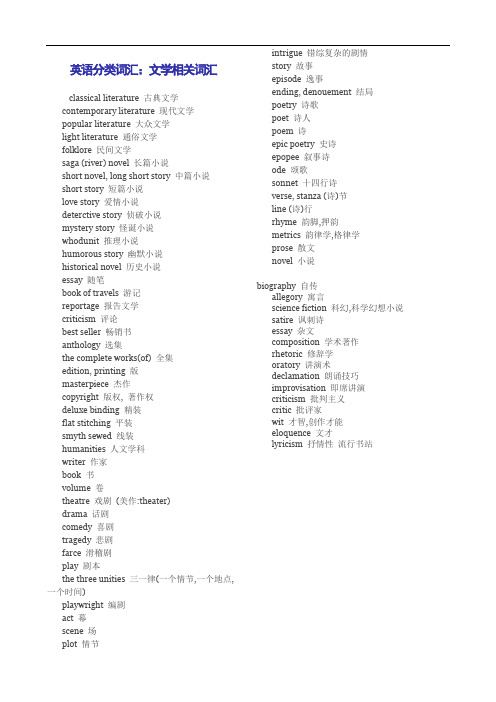
英语分类词汇:文学相关词汇classical literature 古典文学contemporary literature 现代文学popular literature 大众文学light literature 通俗文学folklore 民间文学saga (river) novel 长篇小说short novel, long short story 中篇小说short story 短篇小说love story 爱情小说deterctive story 侦破小说mystery story 怪诞小说whodunit 推理小说humorous story 幽默小说historical novel 历史小说essay 随笔book of travels 游记reportage 报告文学criticism 评论best seller 畅销书anthology 选集the complete works(of) 全集edition, printing 版masterpiece 杰作copyright 版权, 著作权deluxe binding 精装flat stitching 平装smyth sewed 线装humanities 人文学科writer 作家book 书volume 卷theatre 戏剧(美作:theater)drama 话剧comedy 喜剧tragedy 悲剧farce 滑稽剧play 剧本the three unities 三一律(一个情节,一个地点,一个时间)playwright 编剧act 幕scene 场plot 情节intrigue 错综复杂的剧情story 故事episode 逸事ending, denouement 结局poetry 诗歌poet 诗人poem 诗epic poetry 史诗epopee 叙事诗ode 颂歌sonnet 十四行诗verse, stanza (诗)节line (诗)行rhyme 韵脚,押韵metrics 韵律学,格律学prose 散文novel 小说biography 自传allegory 寓言science fiction 科幻,科学幻想小说satire 讽刺诗essay 杂文composition 学术著作rhetoric 修辞学oratory 讲演术declamation 朗诵技巧improvisation 即席讲演criticism 批判主义critic 批评家wit 才智,创作才能eloquence 文才lyricism 抒情性流行书站英语分类词汇:哲学相关词汇感性Sensibility知性Understanding理性Reason认识论theory of cognition先天综合判断a priori synthetic judgment物自体thing-in-itself先验感性论Transcendental Aesthetic感性论Aesthetic直观intuition感觉sensation经验性的直观empirical intuition纯粹的直观pure intuition形而上学;玄学metaphysics质料matter形式form先验逻辑Transcendental logic先验分析论Transcendental analytic先验辩证论Transcendental dialectic纯粹的知性概念pure concepts of the understanding原则的能力faculty of principles规则的能力faculty of rules先验幻相Transcendental illusion宇宙论cosmology二律背反antinomy善的意志good will道德律令moral command至善summum bonum崇高sublime反思判断judgment of reflection[唯]意志论Voluntarism一般陶冶general culture七艺{文法、逻辑、修辞、音乐、算数、几何、天文} Seven liberal arts人本主义;人文主义humanism人本教育;人文教育humanistic education三科{文法、逻辑、修辞} trivium下意识subconsciousness士气morale大修道院学校abbey school大礼堂auditorium女生训导{史} Dean of women女修道院convent女校友alumna 工艺教育arts and crafts education; industrial arts education工艺学校arts and crafts school中古教育;中世纪教育medieval education中央学校{十九世纪初期英国国教派创设的基础学校} central school五项运动{奥运比赛项目} pentathlon公民教育Citizenship education; Education for citizenship公民德行civic virtue反省;反思reflection反省[后]行为reflective behavior反省思考reflective thought天主教教学法catholic pedagogy文化;修养culture文化教育cultural education文化教育学Culture pedagogy文字主义;字句主义verbalism方法论methodology主教座堂学校;圣公会学校Cathedral school; Episcopal school主教学校Bishop's school主智教育;主知教育Intellectualistic education 主智论;主知论Intellectualism主意教育voluntaristic education兄弟会{美国大学男生社团} fraternity可陶冶性;可塑性figurability古典主义Classicism古典语文{古希腊文、拉丁文}classical language 古典学科classical course古典学校;古典学派classical school四目{音乐、算数、几何、天文} quadrivium本性original nature母性maternity母道;母仪mothercraft母语mother language; mother tongue民本教育democratic education民族主义nationalism民族主义教育nationalistic education目的论teleology先天观念innate idea同情sympathy合理化[作用] rationalization回教教育;伊斯兰教育Mohammedan education [= Islamic education]自由意志free will自然主义naturalism自然主义教育naturalistic education自然趋势natural tendency自然惩罚natural punishment判断judgment助理教师assistant teacher助理教授assistant professor形式陶冶;形式训练formal culture [= formal discipline]批判分数critical score批判教育学Critical pedagogy批评课criticism lesson男生训导{史} Dean of men男生通勤学校{英,相对于寄宿学校} boy's day school系统教育学Systematic pedagogy良心conscience儿童之家children's home儿童文学children's literature儿童指导所Child-guidance clinic儿童学Paidology; Paedology夜校{英} moonlight school姊妹会{美国大学女生社团} sorority性格;品格character拉丁文法学校{英、美} Latin grammar school 泛爱主义philanthropism泛爱主义教育philanthropic education泛爱学校philanthropic school社会化socialization社会主义Socialism社会主义教育socialistic education社会学Sociology初民教育primitive education初级教义问答学校;天主教望教友要理班Catechumenal school非教派学校undenominational school品格培养character building; formation of character品格教育character education品格测验character test品格评比character rating品格诊断;品性诊断character diagnosis建教制度{就学与工作时间可轮替之制度} alternating plan; alternating system思考thinking 施济学校{英国中世纪时期修道院的慈善学校} almonry school柔性教育soft education查经班Bible class相属原则Principle of belonging美育aesthetic education美育[教]学esthetic pedagogy美感aesthetic feeling美感判断esthetic judgment美学aesthetics; esthetics军国主义;黩武思想;军国民主义militarism 重述要旨;简述大意recapitulation音乐学校conservatory; music school个人主义individualism修女学校nunnery school修道院cloister修道院教育monastic education修道院学校monastery school; monastic school; cloister school修辞学校rhetorical school伦理教育ethical education伦理学Ethics原理;原则principle原创性originality哲学的教育学philosophical pedagogy宫廷学校Court school; Palace school校友alumnus; alumni {pl.}校友会alumni association校风school ethos格言;行为准则maxim气质temperament消极训练negative discipline消极教育negative education消极适应negative adaptation神学校Theological seminary神学院divinity school; theological college; theological seminary神学教育theological education纯粹科学pure science虔敬主义pietism高级教义问答学校;天主教进阶要理班Catechetical school副校长assistant principal副教授associate professor唱诗学校Choir school问答法question and answer method唯物论materialism唯实主义教育realistic education唯实论;实在论realism国家教育;民族教育national education基督宗教教育Christian education专业道德;专业伦理[学] professional ethics情感[作用];感情affection情操sentiment推论;推理inference [= reasoning]教生{英国17世纪中叶用法};实习教师{英国现行用法} student-teacher; trainee teacher教育工作者educator教育可能性possibility of education教育史History of education教育决定论educational determinism教育委员{十九世纪英国中央层级的教育委员,负责对各级教育的视导} commissioner on education 教育哲学Educational philosophy; Philosophy of education教育价值educational value教育学家;教育学者educationalist; educationist 教育历程educational process教派学校{基督宗教} denominational school; sectarian school教区学校parish school; parochial school教规;训诫precept教会教育Church education; Missionary education教会学校Mission school教义问答教学法{要理问答教学法} catechetic; catechism; catechetic method教仆{古希腊};教育学者pedagogue启蒙运动Enlightenment; The enlightenment理性;理由reason理性教育rational education理性论;理性主义rationalism理想ideal理论教育学theoretical pedagogy现代语文;现代外语{相对于古典语文} modern languages毕业式commencement移动学校{美国初期为解决郊区学子就学问题所提供教师至该区巡回教育的措施} moving school规范科学{相对于实证科学} normative science通艺学科;博艺学科liberal arts陆军学校army school 陶冶;教化cultivation陶治;教育{德} bildung博士论文Doctoral dissertation; Doctorate dissertation博士学位Doctorate; Doctor's degree; Doctoral degree博雅教育liberal education发生法genetic method象征主义symbolism进化论派教育学Evolutionistic pedagogy进步主义教育progressive education传记法biographical method奥林匹克运动会{奥运} Olympian ; Olympic ; Olympic games意志will意志教育education of will意识consciousness意识流streams of consciousness慈善学校charity school感官训练sense training感官唯实论sense realism感官教育sense education感官陶冶sense culture感情;感受;情感feeling爱国主义;爱国情操patriotism新人本主义;新人文主义neohumanism新教育New education新教学校Protestant school暗示suggestion暗示感受性suggestibility暗示诘问suggestive questioning溯因考察causal investigation禁闭confinement punishment禁欲主义Asceticism经院主义;士林哲学Scholasticism经院学者;士林哲学家Scholastic经验教育学Empirical pedagogy经验论;经验主义Empiricism圣经学校Bible school资讯;知识information [=knowledge]运动员风度;运动家精神sportsmanship道德morality道德教育moral education道德教学moral instruction顿悟;洞悟;洞见;洞察insight实用主义pragmatism实质训练material discipline实质陶冶material culture对话法dialogistical method歌咏团glee club演绎法deductive method种族差异race difference罚则penalty schedule诵读学校;阅读学校{中世纪以来的基础识字教育} reading school俭约教育thrift education剑桥制{1839年美国麻州剑桥地区允许资赋优异小学生修读两年即可跳级毕业的措施} Cambridge plan审美aesthetic appreciation模范课model lesson模范学校model school论理次序;逻辑次序logical order论理学;逻辑;理哲学Logic养育{后天教养,与nature相对} nurture学士Bachelor学士学位Bachelors' degree学位巾academic hood学位帽mortar-board学府{古希腊};大学区{法};中学{英、美旧制};学术性质之会社;军事院校academy学者;学生{英} scholar学科轮替制alternation of studies学徒;艺徒apprentice学徒制apprentice ship system; apprentice system学徒教育apprentice ship education学徒学校apprentice school学校;学派school学校志chronicle of school学院袍academic gown导生{英} monitor导生分组制monitorial-group plan导生制{史} monitorial system导生学校monitor school积极教育positive education应用科学applied science矫正院;感化院House of correction斋舍制{英国公学制度} house system归纳法inductive method骑士教育chivalric education惩罚penalty; punishment 艺术教育art education; artistic education续学运动back-to-the-school movement辩证法dialectic; dialectics观念idea观念论{知识论};唯心论{形上学};理想主义{伦理学} idealism陶冶;教化cultivation陶治;教育{德}bildung博士论文Doctoraldissertation Doctoratedissertation博士学位Doctorate Doctor'sdegree Doctoraldegree博雅教育liberaleducation发生法geneticmethod象征主义symbolism进化论派教育学Evolutionisticpedagogy进步主义教育progressiveeducation传记法biographicalmethod奥林匹克运动会{奥运}Olympian Olympic Olympicgames意志will意志教育educationofwill意识consciousness意识流streamsofconsciousness慈善学校charityschool感官训练sensetrainin感官唯实论senserealism感官教育senseeducation感官陶冶senseculture感情;感受;情感feeling爱国主义;爱国情操patriotism新人本主义;新人文主义neohumanism新教育Neweducation新教学校Protestantschool暗示suggestion暗示感受性suggestibility暗示诘问suggestivequestioning溯因考察causalinvestigation禁闭confinementpunishment禁欲主义Asceticism经院主义;士林哲学Scholasticism经院学者;士林哲学家Scholastic经验教育学Empiricalpedagogy经验论;经验主义Empiricism圣经学校Bibleschool资讯;知识information=knowledge运动员风度;运动家精神sportsmanship道德morality道德教育moraleducation道德教学moralinstruction顿悟;洞悟;洞见;洞察insight实用主义pragmatism实质训练materialdiscipline实质陶冶materialculture对话法dialogisticalmethod歌咏团gleeclub演绎法deductivemethod种族差异racedifference罚则penaltyschedule诵读学校;阅读学校{中世纪以来的基础识字教育}readingschool俭约教育thrifteducation剑桥制{1839年美国麻州剑桥地区允许资赋优异小学生修读两年即可跳级毕业的措施}Cambridgeplan审美aestheticappreciation模范课modellesson模范学校modelschool论理次序;逻辑次序logicalorder论理学;逻辑;理哲学Logic养育{后天教养,与nature相对}nurture学士Bachelor学士学位Bachelors'degree学位巾academichood学位帽mortar-board学府{古希腊};大学区{法};中学{英、美旧制};学术性质之会社;军事院校academy学者;学生{英}scholar学科轮替制alternationofstudies学徒;艺徒apprentice学徒制apprenticeshipsystem apprenticesystem 学徒教育apprenticeshipeducation学徒学校apprenticeschool学校;学派school学校志chronicleofschool学院袍academicgown导生{英}monitor导生分组制monitorial-groupplan导生制{史}monitorialsystem导生学校monitorschool积极教育positiveeducation 应用科学appliedscience矫正院;感化院Houseofcorrection斋舍制{英国公学制度}housesystem归纳法inductivemethod骑士教育chivalriceducation惩罚penalty punishment艺术教育arteducation artisticeducation续学运动back-to-the-schoolmovement辩证法dialectic dialectics观念idea观念论{知识论};唯心论{形上学};理想主义{伦理学}idealismad hoc hypothesis 特设性假说naive realism 朴素实在论anomaly 反常negative heuristic 反面启发法auxiliary assumption 辅助假定non-normal science 非常规科学auxiliary hypothesis 辅助假说non-science 非科学basic statement 基本陈述normal science 常规科学behaviourism 行为主义object language 对象语言conceptual framework 概念框架objectivism 客观主义confirm 确证observational statement 观察陈述confirmation 确证operativism 操作主义conjecture 推测panpsychism 泛心论conventionalism 约定论parallelism 平行论conversion 改宗、改变信仰paradigm 规范corroborate 确认corroboration 确认perceptual experience 知觉经验physicalism 物理主义counter-induction 反归纳pluralism 多元论critical rationalism 批判理性主义pluralistic realism 多元实在论critical realism 批判实在论positive heuristic 正面启发法critical thought 批判思维positivism 实证主义crucial experiment 判决性实验potential falsifier 潜在证伪者deduction 演绎、演绎法prescience 前科学degree of corroboration 确认度principle of induction 归纳原理determinism 决定论principle of proliferation 扩散原理dogmatic thought 教条思维principle of tenacity 靭性原理demarcation 分界principle of transference 传递原理disposition 素质、倾向problem of induction 归纳问题downward causation 下向因果性problem shift 问题转换emergence 突现problem situation 问题状况epiphenomenalism 附带现象论proof 证明epistemological anarchy 认识论无政府状态propensity 倾向性epistemology 认识论pseudo-science 类科学、伪科学error-elimination 除错psychologism 心理主义essentialism 本质论radical instrumentalism 激进工具主义explanation 解释rationlism 理性主义fallibilism 易谬主义rationality 理性fallibility 易谬性realism 实在论falsifiability 可证伪性reality 实在falsification 证伪reductionism 还原论falsificationism 证伪主义refutability 可反驳的falsify 证伪refutation 反驳falsity content 虚假性内容research programme 研究纲领first world 第一世界second world 第二世界formal language 形式语言simplicity 简单性gestalt switch 格式塔转换singular statement 单称陈述improbablity 不可几性sophisticated falsificationism 精致的证伪主义irrationalism 非理性主义subjectioism 主观主义guess 猜测tentative theory 试验性理论heuristic 启发法test 检验hypothesis 假说testability 可检验性indeterminism 非决定论theory-laden 渗透理论induction 归纳、归纳法third world 第三世界inductionism 归纳主义thought experiment 思想实验initial condition 初始条件trial and error 试错法instant rationality 即时理性truth content 真理性内容instrumentalism 工具主义universal statement 全称陈述interactionism 相互作用论upward causation 上向因果性irrefutability 不可反驳性verifiability 可证实的justification 证明verification 证实justify 证明verify 证实justificationism 证明主义verisimilitude 逼真性logical positivism 逻辑实证主义world 1 世界1macrologic 宏观逻辑world 2 世界2mentalism 精神主义world 3 世界3metalanguage 元语言metascience 元科学metatheory 元理论micrologic 微观逻辑naive falsificationism 朴素证伪主义naive instrumentalism 朴素工具主义。
全人教育的教育哲学基础
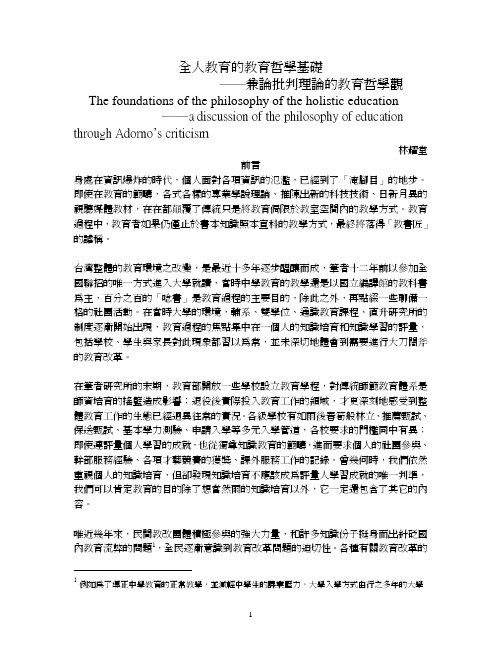
全人教育的教育哲學基礎──兼論批判理論的教育哲學觀The foundations of the philosophy of the holistic education──a discussion of the philosophy of education through Adorno’s criticism林耀堂前言身處在資訊爆炸的時代,個人面對各項資訊的氾濫,已經到了「淹腳目」的地步。
即使在教育的範疇,各式各樣的專業學說理論、推陳出新的科技技術、日新月異的視聽媒體教材,在在都顛覆了傳統只是將教育侷限於教室空間內的教學方式。
教育過程中,教育者如果仍僅止於書本知識照本宣科的教學方式,最終將落得「教書匠」的謔稱。
台灣整體的教育環境之改變,是最近十多年逐步醞釀而成,筆者十二年前以參加全國聯招的唯一方式進入大學就讀,當時中學教育的教學還是以國立編譯館的教科書為主,百分之百的「唸書」是教育過程的主要目的,除此之外,再點綴一些聊備一格的社團活動。
在當時大學的環境,輔系、雙學位、通識教育課程、直升研究所的制度逐漸開始出現,教育過程的焦點集中在一個人的知識培育和知識學習的評量,包括學校、學生與家長對此現象都習以為常,並未深切地體會到需要進行大刀闊斧的教育改革。
在筆者研究所的末期,教育部開放一些學校設立教育學程,對傳統師範教育體系是師資培育的搖籃造成影響;退役後實際投入教育工作的領域,才更深刻地感受到整體教育工作的生態已經迥異往常的實況。
各級學校有如雨後春筍般林立、推薦甄試、保送甄試、基本學力測驗、申請入學等多元入學管道,各校要求的門檻同中有異;即使連評量個人學習的成就,也從獨尊知識教育的範疇,進而要求個人的社團參與、幹部服務經驗、各項才藝競賽的獲獎、課外服務工作的記錄。
曾幾何時,我們依然重視個人的知識培育,但卻發現知識培育不應該成為評量人學習成就的唯一判準,我們可以肯定教育的目的除了想當然爾的知識培育以外,它一定還包含了其它的內容。
第一章 哲学与教育哲学
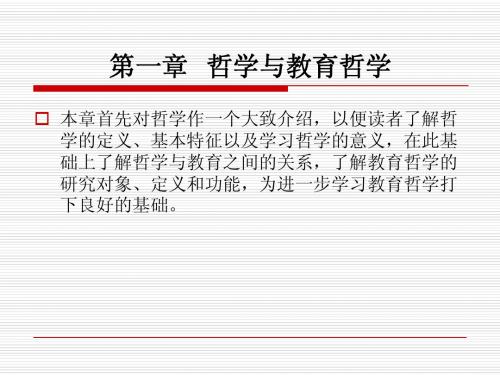
哲学作为一种学科
哲学作为一门知识学科有很长的历史。可以 说哲学是人类最早的知识学科。
哲学作为一种探究方式
哲学的真正意义是作为一种探究的方式,而不只是 作为一种特定的、专门的知识学科。 许多有识之士认为,在对待哲学问题上,除了要 “学”哲学外,还要“做”哲学。所谓“做”哲学, 主要有两层意思:一是坚持自己的抽象理论研究, 但不放弃对现实问题的关注;二是从现实生活世界 的问题中引发对哲学问题的讨论,并提供为一般民 众所忽视的新答案。概括而言,“做”哲学就是强 调把哲学作为一种探究方式。
第一章 哲学与教育哲学
本章首先对哲学作一个大致介绍,以便读者了解哲 学的定义、基本特征以及学习哲学的意义,在此基 础上了解哲学与教育之间的关系,了解教育哲学的 研究对象、定义和功能,为进一步学习教育哲学打 下良好的基础。
第一节 哲学是什么
一、哲学是一种“爱智之学”
“哲学”的原义为“爱好智慧”,它是一种“爱智 之学”。 孙正聿认为,哲学既是爱智的激情,又是“爱 智之忱”的结晶,哲学“熔铸着哲学家对人类 生活的挚爱,对人类命运的关切,对人类境 遇的焦虑,对人类未来的期待”,哲学“不是 超然于人类社会生活之外的玄思和遐想,哲 学不是僵死的教条和冷冰冰的逻辑”。
4.有助于教师形成自己的教育哲学,有 助于学校形成自己的学校教育哲学
教育哲学最终要发挥自己的作用,必须要转化为教师自己个 人的教育哲学和学校的教育哲学,不然的话,可能就仅仅停 留在理论层次上,而不会对具体的教育改革实践产生推动和 促进作用。 教师个人教育哲学主要是个人关于教育工作的基本信念和理想。 这里所指的个人教育哲学,不是指普通人对教育问题的意见, 而是指作为专业工作者的教师对教育工作进行整体反思和领会 之后形成的带有个性色彩的教育信念和教育理想。 学校教育哲学指的是一所学校信奉的教育理念,学校的使命、 愿景和育人目标是其主要内容,其中育人目标是核心,即培养 什么样的学生是学校教育哲学的核心问题,以此为核心,对学 校的使命、愿景进行系统、综合的思考,构成了学校教育哲学 的主要内容。
布鲁贝克的高等教育哲学布鲁贝克《高等教育哲学》读后感

01 引言
03 参考内容
目录
02 高等教育哲学的探讨
引言
约翰·S·布鲁贝克(John S. Brubacher)的《高等教育哲学》 (Philosophy of Higher Education)是一部深入探讨高等教育领域的经典 著作。该书自以来,一直为高等教育研究者、实践者和者所传颂。在本次演示 中,我们将着重探讨布鲁贝克的高等教育哲学思想,以及阅读该书所带给我们 的启示和感悟。
五、建议与展望
在当今社会,随着科技的发展和社会变革的加速,我们需要更加重视知识的价 值并不断提高高等教育的质量。为此,建议教育机构应更加注重课程设置的合 理性和科学性,以帮助学生掌握全面的知识和技能;同时培养学生的道德责任 感和批判性思维能力,以培养具有全面发展的高素质人才。在未来的发展中, 高等教育需要不断创新和完善自身的发展模式,以适应社会的变革和发展需求。
二、知识的价值
1、知识的定义与分类
知识是人类对世界及自身的认识和理解。根据不同的标准,知识可以被划分为 不同的类型,如理论知识、实践知识、显性知识和隐性知识等。理论知识是指 那些关于普遍原理和抽象概念的知识,实践知识则是指那些关于如何做某事的 知识。显性知识是指那些可以明确表达和传递的知识,而隐性知识则是指那些 难以言传和转化的知识。
参考内容三
一、引言
本次演示旨在探讨知识的价值与高等教育哲学的关系,并介绍美国学者约 翰·S·布鲁贝克(John S. Brubacher)的高等教育哲学观点。布鲁贝克在 《高等教育哲学》(The Philosophy of Higher Education)一书中,提出 了独特的高等教育哲学理论,对知识的价值与高等教育的作用进行了深入剖析。
教育词条中英汇总

教育学名词审定项目各分支学科名词汇总“教育基本理论”名词(378条)1.教育(education)2.教育学(pedagogy)3.教育原理(foundationsof education)4.教育理论(educationtheories)5.教育理想(educationalideal)6.教育观(educationconcept)7.教育学体系(system ofpedagogy)8.教育思想(educationalideology)9.教育目的(aims ofeducation)10.儿童本位论(theory ofchildren as standard foreducation)11.个人本位论(theory ofindividualistic asstandard)12.社会本位论(theory ofsociety as standard foreducation)13.教育适应生活说(education as adjustmentto life)14.劳动起源论(theory oflabor as the origin ofeducation)15.心理起源论(theory ofpsychological origin ofeducation)16.生物起源论(theory ofbiological origin ofeducation)17.教育属性(attribute ofeducation)18.教育功能(functions ofeducation)19.教育万能论(omnipotent quality ofeducation)20.遗传决定论(hereditydeterminism) 21.环境决定论(circumstancedeterminism)22.教育现象(phenomenon ofeducation)23.教育本质(essence ofeducation)24.教育活动(educational activities)25.教育过程(process ofeducation)26.教育价值(value ofeducation)27.教育环境(educationalenvironment)28.教育结构(structureof education)29.教育经验(educationalexperience)30.教育可能性(possibility ofeducation)31.教育者(educator)32.受教育者(educatee)33.教育利益(educationgain)34.教育模式(educational pattern)35.教育内容(educational contents)36.教育年限(educational terms)37.教育手段(educational means)38.教育途径(approaches ofeducation)39.教育系统(educationsystem)40.教育职能(functionsof education)41.教育制度(educational institution)42.教育规模(educationalscale)43.教育周期(period ofeducation)44.教育阶段(educationstage)45.教育评价(educationalassessment)46.教育层次(levels ofeducation)47.教育水平(educationallevel)48.教育质量(quality ofeducation)49.教育实践(practice ofeducation)50.教育适应(educationaladaptation)51.教育期望(educationalexpectation)52.教育潜力(educationalpotentialities)53.教育危机(educationalcrisis)54.教育变革(educationalreform)55.教育传统(educationaltradition)56.教育变迁(educationalchange)57.教育民主(educationaldemocracy)58.教育民主化(democracy of education)59.教育现代化(modernization ofeducation)60.教育国际化(internationalization ofeducation)61.教育的世俗化(secularization ofeducation)62.教育先行(theory ofeducational priority)63.人的全面发展(all-round developmentof individual)64.全面发展教育(all-round developmenteducation)65.现代教育(moderneducation)66.博雅教育(liberaleducation)67.公共教育(publiceducation)68.闲暇教育(leisure timeeducation)69.科学教育(scientificeducation)70.素质教育(quality-orientedEducation)71.应试教育(exam-orientedEducation)72.通识教育(generaleducation)73.终身教育(lifelongeducation)74.全民教育(educationfor all)75.全纳教育(inclusiveEducation)76.国际教育(international education) 77.学校教育(schooleducation)78.社会教育(socialeducation)79.社区教育(communityeducation)80.德育(moral education)81.智育(intelligenceeducation)82.体育(physicaleducation)83.美育(education ofappreciation of thebeautiful)84.劳动技术教育(laborand technologyeducation)85.教育哲学(educationphilosophy/philosophy ofeducation )86.传统教育哲学(traditional educationphilosophy)87.分析教育哲学(analysiseducation philosophy) 88.价值危机(values crisis) 89.教育知识(educationknowledge)90.高等教育哲学(philosophy of highereducation)91.教学哲学(teachingphilosophy)92.课程哲学(curriculumphilosophy)93.思辨教育哲学(speculative philosophyof education)94.规范教育哲学(canonical educationphilosophy)95.实践教育哲学(practiced educationphilosophy)96.个人教育哲学(personal philosophy ofeducation)97.专业教育哲学(professional educationphilosophy)98.公共教育哲学(publiceducation philosophy)99.解释学教育哲学(hermeneuticseducational philosophy)100.现象学教育哲学(phenomenologicalphilosophy ofeducation)101.马克思主义教育哲学(Marxist educationphilosophy)102.西方马克思主义教育哲学(Western Marxistphilosophy ofeducation)103.后现代主义教育哲学(post-modernphilosophy ofeducation)104.女性主义教育哲学(feminist philosophy ofeducation)105.教育本质论(essenceof education)106.教育本质主义(education essentialism)107.反教育本质主义(anti-educationessentialism)108.教育价值论(educational value)109.人性论(theory ofhumanity)110.知识论(theory ofknowledge)111.美学(aesthetics)112.宗教教育(religioneducation)113.教育法(Educationlaw)114.教育法律体系(Educational legalsystem)115.教育法渊源(Form ofeducation law)116.教育法学(Science ofeducation law)117.国家教育权(Statepower of education)118.社会教育权(Societyright of education)119.家庭教育权(Familyright of education)120.受教育权(Right toeducation)121.教育惩戒权(Disciplinary power ofeducation)122.依法治教(Administering educationaccording to law)123.中国教育法制(Educational legalsystem in China)124.教育法律关系(Educational Legalrelation)125.政府的教育职责(Government’s legalresponsibility ofeducation)126.学校的权利与义务(Rights and obligationsof the school)127.受教育者的权利与义务(Rights andobligations of theeducatee)128.教师的权利与义务(Rights and obligationsof the teacher)129.家长的权利与义务(Rights and obligationsof the parents)130.政府与学校的法律关系(The legal relationsbetween the governmentand the school)131.学校与教师的法律关系(The legal relationsbetween the school andthe teacher)132.学校与学生的法律关系(The legal relationsbetween the school andthe student)133.教师与学生的法律关系(The legal relationsbetween the teacher andthe student)134.学校与社会的法律关系(The legal relationsbetween the school andthe society)135.教育立法(Educational legislation)136.学校法律地位(legalstatus of the school) 137.学校法人制度(Thesystem of the school aslegal person)138.教育法律责任(Educational legalliabilities)139.教育申诉制度(Educational appealsystem)140.教育人事仲裁制度(The arbitration systemof educational personnel) 141.学生人身伤害事故(Student personal injuryaccident)142.体罚(Corporalpunishment)143.作弊(Cheat in exam) 144.办学自主权(School autonomy)145.青少年犯罪(Juvenile delinquency)146.青少年被犯罪侵害(Juvenile victims) 147.青少年人身伤害(Juvenile personal injury) 148.教育政治学(Educational politics) 149.教育政策(Educational policy)150.教育权力(Educational power)151.教育自由(Educational freedom)152.教育民主(Educational democracy)153.教育平等(Educational equality) 154.教育主权(Educationalsovereignty)155.政治教育(Politicaleducation)156.人权教育(Humanrights education)157.教育的公共性(Publicity of education)158.教育民主化(Democratization ofeducation)159.教育大众化(Popularization ofeducation)160.普及教育(Universalizededucation)161.教育社会学(sociology of education)162.教学社会学(sociology of teaching)163.知识社会学(sociology ofknowledge)164.课程社会学(sociology ofcurriculum)165.教育社会心理学(Educational socialpsychology)166.教育政策社会学(Sociology ofeducational policy)167.教育政治经济学(Political economics ofeducation)168.后工业社会(post-industrial society)169.文化化(culturalization)170.教育选择(Educational selection)171.信息爆炸(knowledgeeconomy)172.学习型社会(Learning society)173.非学校化社会(deschooling society)174.学校消亡论(theory ofthe deschooling)175.知识经济(knowledgeeconomy)176.多元文化教育(multiculturaleducation)177.文化资本(culturalcapital)178.精英教育(Eliteeducation)179.大众教育(Masseducation)180.社会分层(socialstratification)181.教育分层(educationalstratification)182.教育机会(educationalopportunity)183.教育机会均等(equaleducational opportunity)184.学校布局(schoolallocation)185.教师职业声望(occupational prestige ofteachers)186.教师流动(teachers’mobility)187.教育病理(Educationalpathology)188.教育危机(Educationalcrisis)189.学校病(Schooldiseases/ pathology signof school education)190.反智主义(anti-intellectualism)191.文凭危机(Credentialcrisis)192.学历社会(Credentialsociety)193.学校社会学(sociologyof the school)194.学校文化(schoolculture)195.学生亚文化(studentssubculture)196.择校(School choice)197.反学校文化(counter-school culture)198.自我认同(Self-identity)199.班级社会学(sociologyof classroom)200.师生关系(teacher-student relation)201.师生冲突(teacher-student conflict)202.标签理论(labelingtheory)203.辍学(schooldropouts)204.逃学(play truant)205.教师社会学(sociologyof teachers)206.教师职业倦怠(teacher burnout)207.教师期望(teachers'expectations)208.教师角色(teacherrole)209.教师角色冲突(teacher role conflict)210.教师权威(teacherauthority)211.教师专业化(teacher professionalization) 212.青少年社会化(socialization ofadolescent)213.反向社会化(counter- socialization)214.学校失范行为(anomie of school) 215.代沟(generation gap) 216.青少年社会问题(youth social problem) 217.家庭教育(familyeducation)218.独生子女(only child) 219.教育人类学(anthropology ofeducation/educationalanthropology)220.民族教育学(national pedagogy)221.双语教育(bilingualeducation)222.教育民族志(Ethnography ofeducation)223.道德教育(moraleducation)224.德育目标(objections of moral education)225.德育任务(tasks ofmoral education )226.德育功能(functions of moral education )227.德育评价(evaluation of moral education)228.道德品质(moral quality) 229.道德信念(moralconvictions)230.道德理想(moral ideal) 231.道德观念(moralconcepts)232.道德境界(moral ambit) 233.道德准则(moral codes) 234.道德体系(moralitysystems)235.世界观(worldconcept)236.人生观(life concept)237.价值观(values)238.道德律(moral law)239.道德活动(moralactivity)240.道德选择(moralchoice)241.道德调节(moralregulation)242.道德自由(freedom ofmorality)243.道德责任(moralresponsibility)244.道德监督(moralsupervision)245.道德传统(moraltradition)246.他律(heteronomy)247.自律(autonomy)248.道德相对主义(moralrelativism)249.道德形式主义(formalism in moralpractice)250.公德(publicmorality)251.私德(privatemorality)252.公民道德(civicmorality)253.德育过程(process ofmoral education)254.道德发展阶段(stageof moral development)255.德育环境(environmentconductive to moraleducation)256.社会舆论(publicopinion)257.社会道德个体化(individualization ofpublic morality)258.个体道德社会化(socialization ofindividual morality)259.德育对象(objects ofmoral education)260.德育主体(subjects ofmoral education)261.教师威信(prestige ofteachers)262.教师道德(ethics ofteachers)263.德目(virtue)264.道德认识(moralcognition)265.道德情感(moral feeling)266.道德意志(moral will)267.道德行为(moralbehavior)268.道德体验(moralexperience)269.道德评价(moralevaluation)270.道德习惯(moral habit)271.道德感(moral sense)272.自我教育(self-education)273.道德冲突(moralconflict)274.道德两难(moraldilemmas)275.道德判断(moraljudgment)276.道德理性(moralrationality)277.德育原则(principles ofmoral education)278.德育实效性(actualeffect of moraleducation)279.德育途径(approach ofmoral education)280.德育方法(method ofmoral education)281.德育方式(way of moraleducation)282.德育模式(pattern ofmoral education)283.道德认知发展模式(moral cognitiondevelopment pattern)284.价值澄清模式(valueclarification model)285.价值分析模式(valueanalysis model)286.榜样示范法(methodof demonstration byexample )287.情感陶冶法(methodof emotional molding) 288.道德评价法(method of moral evaluation)289.感化(influence)290.道德实践(moralpractice)291.内省(introspection) 292.慎独(Shendu)293.道德说教(moralpreaching)294.道德灌输(moralinfusion)295.德育课程(curriculum of education)296.爱国主义教育(patriotism education) 297.集体主义教育(collectivism education) 298.理想教育(idealeducation)299.公民教育(civiceducation)300.情操教育(sentimentseducation)301.人格教育(character and personality education) 302.环境教育(Environment Education)303.法制教育(Legaleducation)304.教育行政(educationadministration)305.教育行政体制(educationaladministration system) 306.教育行政组织(educationaladministrationorganization)307.教育机构(educational institution)308.教育体制(educational system)309.学校办学体制(system for managing education) 310.学校教育制度(system of schooling)311.双轨学制(dual-trackeducational system) 312.分支型学制(brancheducational system) 313.单轨学制(single-track educational system) 314.班级授课制(classteaching) 315.弹性学制(flexibleeducational system)316.普通教育(commoneducation)317.特殊教育(particulareducation)318.基础教育(fundamentaleducation)319.师范教育(normaleducation)320.民族教育(nationaleducation)321.幼儿教育(preschooleducation)322.小学教育(primaryschool education)323.中学教育(middleschool education)324.职业教育(vocationaleducation)325.工读教育(reformativeeducation)326.高等教育(highereducation)327.义务教育(compulsoryeducation)328.成人教育(adulteducation)329.国家教育考试制度(national education testsystem)330.教师资格制度(teacherqualification system)331.学校(school)332.教师聘任制度(teacherengagement system)333.学历制度(academicrecords system)334.学位证书制度(Academic degreessystem)335.扫盲教育制度(Illiteracy educationsystem)336.学籍管理制度(Schoolroll managementsystem)337.教育评估制度(Educational evaluationsystem)338.教育督导制度(Educational inspectionsystem)339.教育经费拨款制度(educational fundsallocation system)340.学生资助制度(students subsidizationsystem)341.学费减免制度(reducetuition system)342.国家助学贷款制度(national education loansystem)343.学校类型(type ofschool)344.全日制学校(full-timeschool)345.非全日制学校(sparetime school)346.公立学校(publicschool)347.私立学校(privateschool)348.民办学校(non-state-maintainedschool)349.寄宿制学校(residentialschool)350.重点学校(key school)351.基础薄弱学校(basicweak school)352.教育集权制(centralization ofeducation)353.教育分权制(decentralization ofeducation)354.高等教育精英化阶段(elitism of highereducation)355.高等教育普及化阶段(universe-access ofhigher education)356.高等教育大众化阶段(mass-access of highereducation)357.教育规划(educationplanning)358.就近入学(Attendingnearby school)359.教育研究方法(methodof educational research)360.定性研究方法(methodof qualitative research)361.定量研究方法(methodof quantitative research)362.教师职务(teacherduties)363.学位授予(the degreegranting)364.学士学位(Bachelor'sdegree)365.硕士学位(Master'sdegree)366.博士学位(Doctor'sdegree)367.法律硕士(Master ofJudicature)368.教育硕士(Master ofEducation)369.公共管理硕士(Master of Public Administer ) 370.工商管理硕士(Master of Business )371.工程硕士(Master ofEngineering)372.公共卫生硕士(Master of Public Health)373.艺术硕士(Master ofFine Arts)374.体育硕士(master ofphysical education) 375.软件工程硕士(Master of Software Engineering) 376.翻译硕士(Master ofTranslation andInterpreting)377.军事硕士(Master of Military)378.兽医硕士(Master of Veterinary)中国教育史词条一、学官Educational Officer、教职Teaching Post、官署Office1.学官Educational Officer2.大司徒Dasitu, name of a government officer and educational officer3.大司乐the Tiptop Head of the Art Officer4.博士Doctor;Boshi, name of an officer5.文学Officer of Literature6.翰林Hanlin, the member of the Imperial Academy二、生徒Students or Apprentices1.弟子Disciple2.受业弟子Disciple Learning From a Teacher3.及门弟子Disciple Directly Taught by a Master4.著录弟子Disciple Writing and Copying Books and Other Things5.博士弟子Disciple of a Doctor(in feudal China)6.神童Whiz Kid7.生员Examinees Passing Prefectural Test8.私淑弟子Disciple Who Has Not Taken Lessons Directly Under the Master Himself三、教育用书Educational Books1.史籀篇Shi Liu Pian, book for teaching children2.仓颉篇Cang Jie Pian, book for teaching Chinese characters3.急就篇Ji Jiu Pian, book for teaching children Chinese characters4.千字文Thousand-Character Classic5.百家姓The Book of Family Names6.三字经Three Character Primer7.五经The Five Classics8.四书The Four Books四、教育篇目Items of Educational Books1.学记Record About Learning2.乐记Yue Ji, an aesthetic work in Chinese ancient times3.劝学Quan Xue, a book written by Xunzi, encouraging people to study4.解蔽Jie Bi, a book on solving puzzles5.弟子职Di Zi Zhi, a book telling the duties of disciples6.尊师Zun Shi, a book telling honor the teachers7.巫徒Wu Tu, a book on wizardry8.对贤良策Dui Xian Liang Ce, a book about policies for emperors to choose virtuous people9.教子Jiao Zi, a book on teaching children10.师说Shi Shuo, a book written by Han Yu, advocating archaic prose11.大学章句序Da Xue Zhang Ju Xu, an article written by Zhu Xi12.学校论Theory on Schools13.大学Da Xue, a book telling how to study in the period of college14.中庸The Doctrine of the Mean五、概念术语Concepts and Terms1.礼Ceremonial Rites and Regulations2.礼教Ethical Pedagogy3.养士Cultivate Bachelor in Ancient China4.四端Four Basic of Good Human Nature5.积渐Accumulate Gradually6.教化Enlighten People Through Education7.圣人Sage8.三纲领Three Cardinal Guides9.八条目Eight Entries10.为己之学Study to Improve Oneself11.观眸Understanding person by Viewing the Eyes of Pupils12.六戚四稳Ways of Investigating A Person’s Words and Act at Home13.八观六验Ways of Investigating A Person’s Words and Act Outside14.五常Five Ethical Principles15.智仁勇Intelligent、Humanity、Courage16.己所不欲勿施于人What You Do Not Want to Be Done to Yourself, Do Not Do to Others.17.中庸The Mean18.敬Respect19.反求诸己Demand Oneself Adversely from Himself Not Others20.深造自得Obtain Knowledge by Advanced Study Oneself21.絜矩之道The Doctrine of Xieju22.慎独Exercising Cautious in One’s Private Life; Try to Be Blameless in One’s PrivateLife23.居敬穷理Keeping Respectful and Making Thorough Inquiry into Truth24.六艺The Six Arts: Rites, Music, Archery, Charioteering, Calligraphy, Mathematics25.经学Study of the Confucian Classics26.章句之学Philological Study of Confucian Classics27.豫时孙摩A kind of Educational Theories or Principles28.叩两端Making Inquiries Repeatedly29.举一反三Draw Inferences About Other Cases from One Instance30.兼陈中衡Choosing the Proper Thing from the Various Aspects31.罕譬而喻Explaining Clearly With Few Illustrations32.切磋琢磨Learning from Each Other by Exchanging Views33.朱子读书法Reading Methods of Zhu Zi34.分斋教学Teaching in Different Classes35.含道必授Teaching Others When Having Knowledge36.因性练才Teaching Somebody by Following His Character37.文以载道Writing for Conveying Truth38.心师造化Complying with the Painter Himself39.半学A Term of Painting Teaching, which advises to absorb the soul of the teaching but not allthe teaching40.训蒙Educating Children41.洒扫应对Sprinkling, Sweeping and Replying Guests42.师严道尊Respecting What A Strict Teacher Delivering43.升堂入室Having Profound Scholarship44.长善救失Effecting Goodness Saving Loss45.反诸人情Thinking About Human Nature46.距师Not Always Believing in Teacher’s Words Blindly47.诲人不倦Being Tireless in Teaching48.如坐春风Living Together With Lofty and Erudite People Like Being Blew by Spring Breeze49.揠苗助长Pulling the Shoots Upward in A Stupid Effort to Make Them Grow50.读经Studying Confucian Classics51.天理Natural Justice“比较教育”名词一、学科与国际组织1.比较教育(comparative education)2.比较高等教育(comparative higher education)3.比较成人教育(comparative adult education)4.比较四步法()5.并置(juxtaposition)?6.国际数学与科学教育成就研究(TIMSS,The Trends in International Mathematics and Science Study)7.洞察法()?8.多元文化教育(multicultural education)9.发展教育(development education)10.国际合作与和平教育联系学校计划(Associated Schools Project in Education for International Cooperation and Peace)?11.国际教育(international education)12.国际教育标准分类(International Standard Classification of Education)13.国际教育年(International Year of Education)14.国际教育成绩评价协会(IEA, International Association for the Evaluation of Educational Achievement)?15.国际理解教育(education for international understanding)16.国际学生评价项目(PISA,Programme for International Student Assessment)17.霍尔姆斯问题法()18.教育国际化(internationalization of education)19.教育语汇(education idioms)?20.教育全球化(globalization of education)21.解释(interpretation)?22.借鉴时代(period of borrowing)23.卡拉奇计划(Karachi Plan)24.民族性(national character)25.描述(description)?26.区域教育研究(regional studies of education)27.社会科学方法时代(period of social sciences methods)28.外国教育(education abroad)29.亚洲教育发展模式(Asian model for educational development)30.亚洲太平洋地区职业技能发展计划(Asian and Pacific Skill Development Programme)31.伊拉斯谟计划(Erasmus Mundus)32.波隆亚协议33.因素分析时代(period of factors analysis)34.中心-边缘理论(center-periphery theory)35.全民教育(Education for All)36.学会生存(Learning to be)37.教育的四个支柱(four pillars of education)38.双语教育(bilingual education)39.民众中学(folk high school)40.人民大学(people’s university)41.第三级教育(tertiary education)“教育经济”名词(391条)(按拼音排序)A阿尔法系数a. coefficientB班级规模Class size 半参数模型semi parametric model鲍尔斯模型Bowel’s model 补偿教育Compensation education不完全市场Market imperfect 部分均衡分析partial-equilibrium analysisC财政教育拨款Financial allocation for education 财政中立Fiscal neutrality参数估计Parameter estimation 测量误差Measurement error差生Less Able student 差异需求Differentia demand超额需求Excess demand 沉没成本Sunk cost成本补偿Cost recovery 成本函数Cost functions成本可行性分析Cost feasibility analysis 成本-收益分析Cost-benefit analysis成本-效果分析Cost-effectiveness analysis 成本-效率分析Cost-effectiveness analysis 成本效用分析Cost utility analysis 成功学校Success for all schools乘数效应Multiplier effect 充分就业Full employment处理不均衡能力Ability to handle disequilibrium 辍学率Drop out rate磁石学校Magnet schoolD代际流动Intergenerational mobility 代际效应Generational effect代内流动Intragenerational mobility 待业Job-waiting待业率Job-waiting rate丹尼森经济增长因素分析法E.F. Denson’s element analysis approach of economic growth单位成本Unit cost单位教育产出的投入Cost of unit educational output单位教育投入产出Output of unit educational investment单项教育成本Single item educational cost抵制理论Theory of resistance 蒂波特理论Tiebert theory动态模型Dynamic model 多水平分析Multi-level analysisE二元劳动力市场Dual labor market 二元劳动力市场假说Dual labor market hypothesisF反事实counterfactual 方差variance方差分解Variance decomposition 方差分析Analysis of variance非参数模型nonparametric model 非货币收益Non-pecuniary benefits非自愿失业Involuntarily unemployed 分位数回归Quantile regression复杂劳动Complex laboringG格雷欣法则Gresham`s Law 个人教育需求Private demand for education 个体异质性Individual heterogeneity 工具变量Instrument variable工作竞争模型Job competition model 工作匹配理论Job matching theory公办教育Public education 公办教育Public education公共产品Public good 公共教育财政体制Public financial system of education 公共选择Public choice 公共选择Public choice公平Equity 巩固率Staying on rate过渡教育Over educationH合成谬误Fallacy of composition 合格率Rate of eligibility of education合约学校Contract school 横向公平Horizontal equity后勤社会化忽略变量偏差Omitted variable bias回归分析Regression analysis 货币收益Pecuniary benefitsIJ积极人力政策Active policy of manpower 基准(组)Bench mark绩效预算Performance budgeting 激进教育经济学派Radical economics of education 挤出效应Crowding out effect 计划-项目-预算-评价系统PPBES寄宿制Residential system 加速学校Accelerated school project家庭教育成本Family education cost家庭社会经济背景Family socioeconomic background家庭社会经济背景SES 家庭学校Home schooling间接效应Indirect effect 简单劳动Simple laboring奖学金Scholarship 交互效应Interaction effect教会学校Church school 教师单一薪金制Single salary schedule教师工作量Teacher’s work load 教师供给Teacher supply教师劳动报酬Renumertation for teachers’ work; teachers’ pay教师劳绩薪金支付制System of paying teachers merit services salary教师培训费用Cost of teacher training教师平均工资Average pay of the teaching staff and workers of teacher教师职位-劳绩薪金制Position and merit service salary system of teachers教师职业声望Occupational prestige of teachers教育边际报酬率Marginal rate of return to education教育边际成本Educational marginal cost教育边际收益Marginal benefit of education教育边际收益递减Diminishing marginal returns to education教育边际效率Marginal efficiency of education教育变动成本Educational variable cost 教育标准成本Standard educational cost 教育拨款Educational appropriation 教育不平衡Imbalance of education教育不足undereducated 教育布局Distribution of education教育布局Educational distribution 教育财力资源Educational monetary resources 教育财务分析Analysis of education finance教育财务管理Management of educational financing教育财政Educational finance 教育财政Educational fiscal教育财政公平性Equity in educational financing 教育财政学Educational finance教育产权教育超额成本Excess of education cost 教育成本Educational cost 教育成本补偿Cost-recovery in education 教育成本对象教育成本分担Shared cost of education 教育成本分配教育成本负担教育成本管理Education cost administration 教育成本归集教育成本核算Education cost accounting 教育成本控制Education cost control 教育成本预测Forecasting of education cost 教育成本指数Cost of education index 教育成本最大化Maximization of educational cost教育成果经济检验Economic evidence of education achievement教育成果经济效用Tangible economic result of education achievement教育成果数量指标Quantitative index of educational output教育成果质量指标Quality index of educational output 教育程度Educational degree教育程度Educational degree教育存量Education stock/accumulated years and expenses教育大众化Mass education教育代际流动generational mobility in education教育贷款Education loan 教育单位成本Educational unit cost教育单位投入量Per uint educational inputs教育的社会需求Social demand for education教育的外部性External efficiency of education教育范围经济Economies of scope in education教育放权Educational decentralization 教育费附加教育费用简化法Simplification approach of education expenditure教育分层Educational stratification 教育分流Educational streaming教育分配收益Educational benefits in income distribution教育风险Educational risks 教育风险投资Risk investment in education 教育附加教育个人成本Personal cost of education 教育个人收益Private benefits of education教育个人收益率Private rate of return for education 教育公用支出教育供给Education supply 教育供给Education supply教育固定成本Educational fixed cost 教育固定成本Fixed cost of education 教育规划Educational planning 教育规模Educational scale教育规模不经济Diseconomics of scale in education教育规模经济Economies of scale in education教育会计成本Accounting cost of education 教育会计制度教育机会成本Earning forgone for education 教育机会成本Indirect cost of education 教育机会成本Opportunity cost of education教育机会平等Equality of educational opportunity 教育基建支出教育基金Educational fund/endowment教育基尼系数Gini coefficient of education教育绩效Educational effectiveness 教育集权Educational centralization教育集权制Centralization of education 教育集资Fund raising for education教育价格Educational price 教育价格Price of education教育价格指数Education price index 教育间接成本Indirect educational cost 教育间接收益Indirect returns to education 教育减税Tax abatement for education 教育简化法Simplification approach of education level 教育借贷Educational loan教育经常成本Educational running cost教育经常费Current expenses for education教育经费Educational expenditure教育经费会计Accounting of educational expenditure教育经费审计Auditing of educational expenditure 教育经费预算Educational budget教育捐赠Educational endowment 教育扩展Educational expansion教育浪费Educational wastage教育免税补助金Educational tax free allowance教育内部不经济Internal diseconomies of education教育内部效率Internal efficiency of education教育内涵式发展Intensional development of education教育年限Compete years of education 教育年限Years of schooling教育人员支出教育社会成本Social cost of education 教育社会收益Social benefits of education教育生产函数Educational production function 教育市场化教育事业支出Public current expenditure of education教育收益Return to education教育收益的长期性Lasting benefit of education教育收益的滞后性Lag benefit of education教育收益率Rate of return to education 教育投入产出Educational input and output 教育投入产出法Method of input-output in education 教育投入主渠道教育投资Educational investment 教育投资比例Ratio of educational investment 教育投资来源Source of educational investment教育投资内部分配结构Distribution structure of education investment。
赫钦斯教育思想
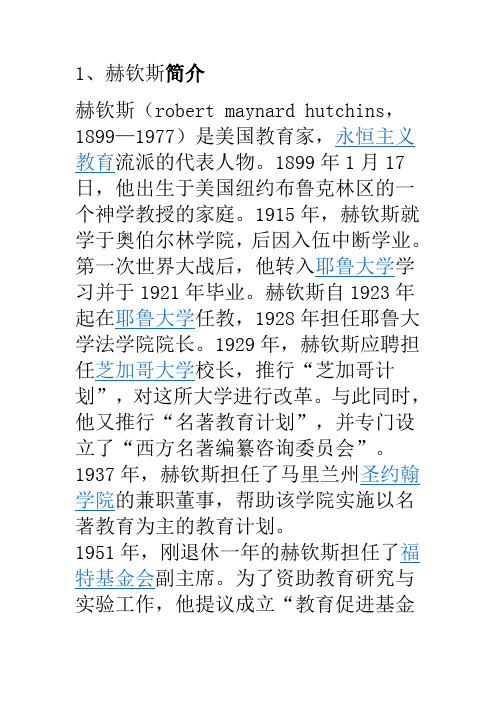
1、赫钦斯简介赫钦斯(robert maynard hutchins,1899—1977)是美国教育家,永恒主义教育流派的代表人物。
1899年1月17日,他出生于美国纽约布鲁克林区的一个神学教授的家庭。
1915年,赫钦斯就学于奥伯尔林学院,后因入伍中断学业。
第一次世界大战后,他转入耶鲁大学学习并于1921年毕业。
赫钦斯自1923年起在耶鲁大学任教,1928年担任耶鲁大学法学院院长。
1929年,赫钦斯应聘担任芝加哥大学校长,推行“芝加哥计划”,对这所大学进行改革。
与此同时,他又推行“名著教育计划”,并专门设立了“西方名著编纂咨询委员会”。
1937年,赫钦斯担任了马里兰州圣约翰学院的兼职董事,帮助该学院实施以名著教育为主的教育计划。
1951年,刚退休一年的赫钦斯担任了福特基金会副主席。
为了资助教育研究与实验工作,他提议成立“教育促进基金会”。
1954年,赫钦斯改任共和国基金会总裁。
1977年5月14日,赫钦斯因病去世。
他的主要教育著作有:《美国高等教育》、《为自由而教育》、《教育中的冲突》等。
永恒主义教育20世纪20年代,在美国一些学院和大学讲授经典著作的“不受约束”的青年教师形成了一个小团体,其中的核心人物是:赫钦斯,他30岁任芝加哥大学校长;爱德勒和布坎南等。
这些青年教师为宣传自己的观点,发表了大量的著述和演讲,因而逐渐扩大了影响。
人们把他们称为“名著仔”(Great Book Boys)。
爱德勒对这个称呼不太满意,提出他们应该自称为永恒主义者(Perennialists)。
永恒主义因此而得名。
学派简史这一传统的教育流派,也称新古典主义教育。
它产生于20世纪20年代的美国,流行于50年代的英、法等国,之后逐渐衰落。
最主要的代表有美国教育家赫钦斯、法国的阿兰和英国的利文斯通。
2学科内容永恒主义作为一种教育哲学,坚持主张过去的东西是卓越的,为宇宙、人性、知识和真善美的不变的本质辩解,认为凡是值得向往的东西都是永恒不变的。
关于布鲁贝克《高等教育哲学》的反思

关于布鲁贝克《⾼等教育哲学》的反思2019-10-04摘要:布鲁贝克的《⾼等教育哲学》是进⾏⾼等教育研究必不可缺的重要资料。
本⽂在解析、探究《⾼等教育哲学》思想的基础上,对作者是否提供了⼀个完整的⾼等教育哲学体系、⾼深学问作为⾼等教育的基点是否准确、认识论教育哲学与政治论教育哲学能否协调在⼀起以及学术⾃由与学术⾃治到底有没有限度等问题进⾏了反思并做了简要的论述。
关键词:⾼等教育;哲学观;布鲁贝克约翰·S·布鲁贝克是美国著名的教育家,他对⾼等教育的著述颇丰,如《转变中的⾼等教育》、(Higher Education in Transition:An American History)《⾼等教育政策的基础》(Bases for Policy in Higher Education)、《⾼等教育哲学》(On the Philosophy of Higher Education)等。
其中,《⾼等教育哲学》(On the Philosophy of Higher Education)以严谨的结构及深刻的思想,成为⾼等教育哲学研究的重要资料。
这本著作以⾼深学问为⾼等教育的逻辑基点,⽴⾜于美国⾼等教育的现状,提出了关于⾼等教育的⼋个基本问题,并对这些问题从哲学的层⾯进⾏了阐释与说明。
然⽽,在我们深刻领悟布鲁贝克⾼等教育哲学思想精华的同时,还应该时刻⽤辩证与批判的眼光看待问题,⾼深学问作为⾼等教育哲学的逻辑基点是否准确、本书是否构建了⼀个完整的⾼等教育哲学体系等问题还需要进⼀步的研究与探讨。
⼀、布鲁贝克《⾼等教育哲学》的主要思想(⼀)⾼等教育的起点是⾼深学问在《⾼等教育哲学》这本著作中,布鲁贝克认为“关键的哲学问题并不是寻求各种答案的共同基点,⽽是寻求各种问题的共同基点。
”[1]⽽⾼等教育的共同基点,他认为便是“⾼深学问”。
在这⾥,布鲁贝克⾸先对“⾼深学问”中的“⾼深”进⾏了界定。
⼀⽅⾯,他认为 “⾼深”是与中⼩学教育所传递的内容相对⽽⾔的。
什么是教育哲学1

存在问题不等于生存问题。 生存问题只涉及具体的存在方式,存在问题 则关系到存在本身的意义、价值和根据。 从逻辑上讲,存在问题是人生的根本问题, 生存问题是人生的枝节问题,是建立在根本 问题的解决或假定解决的基础上的; 从日常经验上说,存在问题的提出要先于 生存问题。
50年代末60年代,教育哲学生死存亡辩论(布劳迪、 科南特)。 科南特(师范教育改革运动):取消教育哲学,由一 般哲学取而代之。 布劳迪:改进教育哲学的教学和研究。
特征: 1、专业分析教育哲学衰落,业余公共教育哲学兴 起; 2、教育哲学的合法性基础得到了新的阐释; 3、教育哲学的教学和研究关注教育改革与实践; 4、实用主义和马克思主义出现了复兴。
1.从‚大写的‛哲学到‚小写的‛哲学; 2.从‚贵族的‛哲学到‚平民的‛哲学; 3.从‚认识的‛哲学到‚存在的‛哲学; 4.从‚规范的‛哲学到‚解放的‛哲学; 5.从‚抽象的‛哲学到‚具体的‛哲学。
罗蒂 ‚大写的哲学‛:哲学是一切文化之王,时 代精神的精华;哲学家是一切知识分子之王; 哲学活动的目的是‚发现‛真理、善或最终 原则,揭示本质;哲学是科学的科学。 ‚小写的哲学‛:哲学是文化中的一类知识, 和其他知识是平等的;哲学融入人类交流之 中的,担当文化评判者的角色。
“贵族的哲学‛:哲学作为文化之王是在教育 和学习的最高阶段才需要学习和研究的;哲 学不同于实用的知识,不是为了满足世俗的 需要,而是为了满足理智沉思的需要;哲学 的学习和研究需要与众不同的非凡智力和专 心。 ‚平民的哲学‛:哲学是人人需要的智慧, 哲学与每一个人类的成员同在。
“认识的哲学‛:认识论问题是哲学的核心,人被简 化成认识的主体,甚至被当作认识的工具。 ‚存在的哲学‛:哲学的对象是整个存在;哲学追求 一种‚内在的确定性‛,是一个人整个的存在所参 与的;哲学的知识不是‚向前进展的;哲学意味着 无休止地追寻,以领悟人的现实境况中的那个实在; 哲学根植于缺乏交流的危难中,根植于真实交流的 追寻中,根植于充满善意的争辩中;威胁哲学的力 量包括宗教、集权和世俗的功利主义。
23《教育哲学导论》-王海涛

教育哲学导论教学大纲一、课程介绍1.课程描述本课程为面向全校学生的通识教育选修课,意在通过教育哲学问题的思考和讨论,扩展和深化重要教育问题及哲学问题的理解。
2.设计思路通过哲学问题的思考和讨论,加深对教育哲学问题的认识。
指导学生阅读重要教育哲学文献,分享同学们的简介。
3.无先修课程要求。
二、课程目标1.引导和帮助同学们思考和讨论一些重要的教育哲学问题,如人生与教育、知识与课程、理性与教学、自由与教育、民主与教育等。
通过讨论,帮助同学们了解教育哲学思考的特征,学习对一些教育问题进行教育哲学的思考。
2.指导同学们阅读一些重要的教育哲学文献,学习批判性理解和讨论哲学家及教育哲学家们的主要观点。
3.分享同学们的见解,帮助同学们获得基于理性思考的积极的、自主的、研究性的学习经验。
4.结合课程的学习与问题的讨论,对同学们的内在成熟有所助益。
三、学习要求要求同学们积极参与讨论,与同学分享自己的学习成果,根据指导修读教育哲学文献,完成作业及论文。
二、教学内容四、参考教材与主要参考书1.教材:《新编教育哲学导论》,石中英著,北京师范大学出版社,2007。
2.主要参考书: (1)黄济著:《教育哲学通论》,山西教育出版社,1999。
(2)陆有铨著:《现代西方教育哲学流派》,河南教育出版社,1995。
(3)崔相录著:《20世纪西方教育哲学》,黑龙江教育出版社,1990。
(4)石中英著:《知识转型与教育改革》,教育科学出版社,2001。
(5)金生鈜著:《理解与教育》,教育科学出版社,1996。
(6)周浩波著:《教育哲学》,人民教育出版社,2000。
(7)谢夫勒著:《人类的潜能》,石中英译,华东师范大学出版社,2006。
(8) Peters, R.S., Philosophy of Education, Oxford University Press,1973.(9) Hirst, .P. & White, P., Philosophy of Education: in the AnalyticTradition, Routledge, 1988.五、成绩评定(一)考核方式 C :A.闭卷考试 B.开卷考试 C.论文 D.考查 E.其他 六、学术诚信学习成果不能造假,如考试作弊、盗取他人学习成果、一份报告用于不同的课程等,均属造假行为。
我的教育哲学观论文 (1)

我的教育哲学观院系:教育研究院姓名:石绍惠学号:1032011309027我的教育哲学观摘要:生活是教育之根和本。
教育与生活的脱节有其深刻的科学观和科学哲学根源。
从这个根源出发,我们可以探寻到教育回归生活的途径,那就是从知识教育回归文化教育、再从文化教育回归生活教育的途径。
教育不仅要回归并深深地扎根于现实的生活,从而重新找回生活之根和本,而且还要回归并融于生活的理想,从而引领现实的生活。
教育哲学不仅仅只是理论,它还跟实际生活紧密联系着。
那么如何将这些看上去是理论的东西跟我们的教育经历结合起来,讨论我们所经历的教育是好是坏呢?如何用教育哲学知识来思考教育方法的正确与否呢?等等,这些都需要我们去深入探究关键字:教育哲学教育哲学教育生活经历当代教育问题一、什么是教育教育是培养新生一代准备从事社会生活的整个过程,也是人类社会生产经验得以继承发扬的关键环节,主要指学校对适龄儿童、少年、青年进行培养的过程。
广义上讲,凡是增进人们的知识和技能、影响人们的思想品德的活动,都是教育。
狭义的教育,主要指学校教育,其涵义是教育者根据一定社会(或阶级)的要求,有目的、有计划、有组织地对受教育者的身心施加影响,把他们培养成为一定社会(或阶级)所需要的人的活动。
类型有正规教育、成人教育、技术教育、特殊教育、终身教育等。
二、什么是哲学哲学:爱智慧——来源于古希腊文philosophia, 意思是追求philem 和智慧 sophia.在汉语中,“哲”是智慧的意思。
哲学是“智慧之学”,即关于智慧的学问。
关于人类生存发展和安身立命之学的大智慧。
哲学是以分析思考探究和反省有关生活、知识以及价值等根本问题的学科。
哲学与艺术不同,哲学是通过批判性的思考去处理问题的哲学与科学不同,哲学以纯粹思考来解决问题,科学则以观察和实验为主要方法。
三、什么是教育哲学?(philosophy of education)教育哲学可以理解为用哲学的观点、方法研究、分析、解释教育问题的学问。
教育哲学的意义

随着基础教育改革的日益深化,越来越多的人开始觉得具体操作层面的东西不解渴、不透彻、不深刻,他们开始寻求一种更深层的东西。
这种深层探索的主要工具或者说手段就是教育哲学。
石中英教授呼吁,教育哲学应当成为教师成长和实施教育行为的一个重要精神资源!石中英,男,1967年出生,教育学博士,现为北京师范大学教育学院副院长、教育学系主任、教授、博导。
曾获北京市第五届哲学社会科学优秀成果二等奖、北京市第七届哲学社会科学优秀成果一等奖、霍英东教育基金会第八届高校青年教师奖,主要著作有《教育学的文化性格》、《知识转型与教育改革》、《教育哲学导论》等。
10年前,我们可能会说:“教育哲学是干什么的?”但现在这样的问题似乎不会再出现了。
最近一两年,随着基础教育改革的日益深化,随着教育理论的很多基本理论问题、实践问题越来越突出,越来越多的人开始觉得具体操作层面的东西不解渴、不透彻、不深刻,他们开始寻求一种更深层的东西。
这种深层探索的主要工具或者说手段就是教育哲学。
近日,教育哲学领域著名学者、北京师范大学教育学院石中英教授呼吁,要让教育哲学成为教师成长和实施教育行为的一个重要精神资源!什么东西是好的?教育哲学为教育提供了价值判断记者:在一般人的印象中,教育是由无数琐碎的小事构成的一种具体行动,而哲学则是形而上的抽象理论,它们之间似乎没有太多的联系。
教育真的需要哲学吗?石中英:马克思主义的哲学告诉我们,事物都是普遍联系的。
这个原理说明在具体事物的中间有着一般性的知识假设、价值追求和伦理信念,比如说这里面什么东西是好的、什么东西是真的、什么东西是有意义的。
这些问题的追问和反思,是普遍存在于日常生活中的,包括存在于这种日常的教育生活中。
在实际的工作里面,一些具体教育问题的解决或者具体教育问题的思考,最后都要追溯到一些这种比较一般性的,我们用哲学的话说就是比较抽象的一些问题上来。
比如说一个老师打学生了,这是个具体问题吧?以前我们说老师打学生是天经地义的,学生学不好,老师就是要打,这就涉及很复杂的一些问题。
高等教育哲学
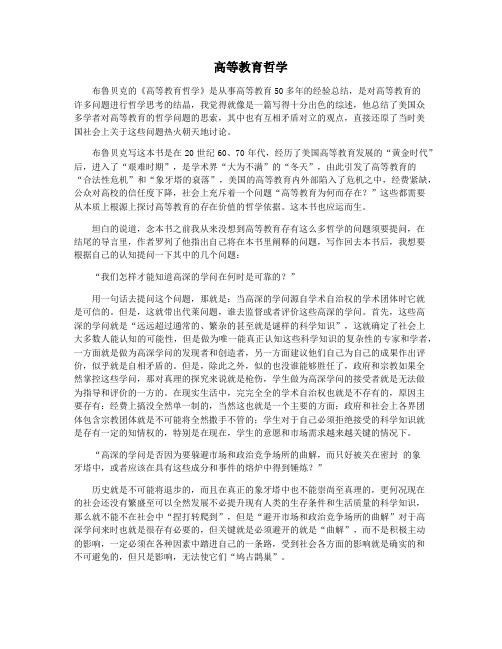
高等教育哲学布鲁贝克的《高等教育哲学》是从事高等教育50多年的经验总结,是对高等教育的许多问题进行哲学思考的结晶,我觉得就像是一篇写得十分出色的综述,他总结了美国众多学者对高等教育的哲学问题的思索,其中也有互相矛盾对立的观点,直接还原了当时美国社会上关于这些问题热火朝天地讨论。
布鲁贝克写这本书是在20世纪60、70年代,经历了美国高等教育发展的“黄金时代”后,进入了“艰难时期”,是学术界“大为不满”的“冬天”,由此引发了高等教育的“合法性危机”和“象牙塔的衰落”,美国的高等教育内外部陷入了危机之中,经费紧缺,公众对高校的信任度下降,社会上充斥着一个问题“高等教育为何而存在?”这些都需要从本质上根源上探讨高等教育的存在价值的哲学依据。
这本书也应运而生。
坦白的说道,念本书之前我从来没想到高等教育存有这么多哲学的问题须要提问,在结尾的导言里,作者罗列了他指出自己将在本书里阐释的问题,写作回去本书后,我想要根据自己的认知提问一下其中的几个问题:“我们怎样才能知道高深的学问在何时是可靠的?”用一句话去提问这个问题,那就是:当高深的学问源自学术自治权的学术团体时它就是可信的。
但是,这就带出代莱问题,谁去监督或者评价这些高深的学问。
首先,这些高深的学问就是“远远超过通常的、繁杂的甚至就是谜样的科学知识”,这就确定了社会上大多数人能认知的可能性,但是做为唯一能真正认知这些科学知识的复杂性的专家和学者,一方面就是做为高深学问的发现者和创造者,另一方面建议他们自己为自己的成果作出评价,似乎就是自相矛盾的。
但是,除此之外,似的也没谁能够胜任了,政府和宗教如果全然掌控这些学问,那对真理的探究来说就是枪伤,学生做为高深学问的接受者就是无法做为指导和评价的一方的。
在现实生活中,完完全全的学术自治权也就是不存有的,原因主要存有:经费上搞没全然单一制的,当然这也就是一个主要的方面;政府和社会上各界团体包含宗教团体就是不可能将全然撒手不管的;学生对于自己必须拒绝接受的科学知识就是存有一定的知情权的,特别是在现在,学生的意愿和市场需求越来越关键的情况下。
分析教育哲学终
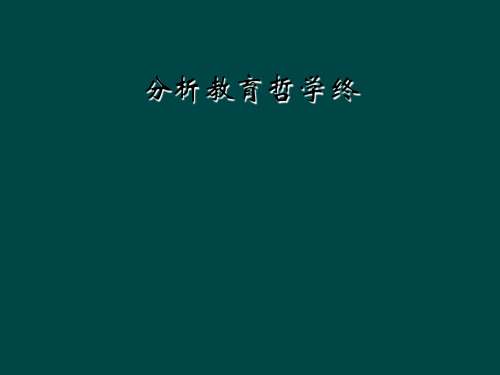
奥康纳(D. J. O’CONNOR)
代表作《教育哲学导论》。1957
这位热心教育问题的哲学家的工作进一步加 强了教育哲学分析化的趋势,将分析哲学与 教育哲学结合起来。
比较哈迪,首先把分析哲学的工具运用于“价 值标准”、“价值判断”、“教育理论”等概 念中。
第二,他对哲学在教育理论中所能起的作用问 题,采取更强硬的立场。他试图变分析哲学的 方法为一把“奥卡姆剃刀”,把无法用经验证 实的形而上学、价值论等传统教育哲学的核心 内容全部剃光,以净化教育理论,使之成为科 学。
分析教育哲学终
目录
一、时代背景
二、定义及发展
三、各个时期代表人物 四、反思与评价
分析教育哲学发展
20世纪50-70年 20世纪40年代 代
20世纪80年代 20世纪70年代末
分析教育哲学的三个阶段
将逻辑实证主义作 为公开宣称的出发 点
伦敦学派
美国派概念的“逐 一”分析时期
定义
分析教育哲学——一种“元教育哲学” (meta-philosophy of education )主张运用分 析哲学的方法对教育的概念、命题以及问题 进行分析和澄清,以便使教育活动更有意义、 更富成效。
1945年毕业于美国布鲁克林学院,1952年获 宾夕法尼亚大学哲学博士学位,1952年起任 教于哈弗大学。
主要著作有:《教育的语言》1960
《理性和教育》1973
培养了许多杰出学生。(彼得斯、索尔蒂斯)
以他为首的一批美国分析教育哲学家,形成自己 独有的风格,被称作“美国派”。
谢弗勒(美国派)的观点
强调教育研究“是一种使人们对值得去追求 的东西看得清楚,并集中注意与此的一种方 式”。
主要著作有《伦理学与教育》1966、《教育 的概念》1967、《教育哲学》1973等。
- 1、下载文档前请自行甄别文档内容的完整性,平台不提供额外的编辑、内容补充、找答案等附加服务。
- 2、"仅部分预览"的文档,不可在线预览部分如存在完整性等问题,可反馈申请退款(可完整预览的文档不适用该条件!)。
- 3、如文档侵犯您的权益,请联系客服反馈,我们会尽快为您处理(人工客服工作时间:9:00-18:30)。
教育哲学:1. The Republic (excerpt):The allegory of cave. What do the images in the cave stand for? What is Plato‟s understanding of the nature of education?The central theme in the book seems to be the nature of justice, a topic in political philosophy, but Plato also has his characters explore issues inPhilosophical cosmology(宇宙)Philosophical theology神学,Philosophical anthropology人类学According to Plato,The best possible political system (state)will be ruled (governed) byPHILOSOPHERS!The Good & the SunThe Good is to the mind as the sun is to the eye, i.e., just as the sun‟s light enables the eye to see in the perceptible realm, so the Good illuminates the mind andenables it to “see” in the intelligible realm.The caveThe cave is the region accessible to sight or perception.The world outside and above the cave is the intelligible region (517B4), accessible not to perception but to reasoning.The upward journey out of the cave into daylight is the soul's ascent to the intelligible realmThe shadows on the wallStand for the notions of things that people have in their minds, notions that are more or less closely related to the things of which they are notions.The puppets and objects from which the shadows are castStand for what we call real things--real rhinos, real countries with their actual living conditions, and anything else that one encounters in the world.The sunStands for the idea of goodness or "the Good."The Allegory of the Cave describes four stages through which a person has to pass to get a sound education. These stages are distinguished by what a learner is able to see. An ignorant person can see only shadows—without even suspecting that they are not real things.A fully educated person can see the shadows, the puppets that cast the shadows,the original things after which the puppets are modeled, and the sun that makes the original things visible.The purpose of Platonic educationTo free the soul of the things that turn its sight downward and to reorient it towards the truth (519A8-B5). Such education is liberating. It is also liberal -- Plato insists that studies in the mathematical sciences not be "compulsory"(epanagkês), on the grounds that "compulsory intellectual work never remains in the soul" (536D5-E4).At the age of 30 there would be another selection; those who qualified would study dialectics and metaphysics, logic and philosophy for the next five years.They would study the idea of good and first principles of being. Afteraccepting junior positions in the army for 15 years, a man would havecompleted his theoretical and practical education by the age of 50.2. The Education of Nature:Education of nature, education of men, education of things; Habit vs. nature; Making a man vs. making a citizen; Public and common education vs. individual and domestic education3. The Democratic Conception in Education:¢1.What is democracy? What are two traits of a democratic society? What is democratic education?It is not just a form of government, but primarily a mode of social life that is unique in providing an adequate setting for human flourishing.“A freeing of individual capacity in a progressive g rowth directed to social aims.”Dewey thus conceives of democracy itself as educative in a way thatreconciles the good of the individual and the good of society.¢2. What are the strengths and critics of the Platonic educational philosophy?¢3.What are the strengths and critics of the “individualistic” ideal of the eighteenth century?¢4. What are the strengths and critics of the institutional idealistic philosophy of the nineteenth century?¢5.What is Dewey‟s philosophy of education?Education is a social process; education is growth; education is not a preparation for life but is life itself.4. Banking v. Problem-solving Models of Educationl What is banking mode of education?The teacher talks about reality as if it were motionless, static, compartmentalized, and predictable. Or else he expounds on a topic completely alien to the existential experience of the students. His task is to 'fill' the students with the contents of his narration.Banking education seeks to maintain the contradiction. It does not engage students in critical thinking, instead, it requires the students to be passive and to adaptthereby serving the purposes of oppression. It inhibits creativity, it resists dialogue, it is fatalistic in nature.l What is problem-solving mode of education?In problem—posing education, people develop their power to perceive critically the way they exist in the world with which and in which they find themselves; they come to see the world not as a static reality, but as a reality in process, intransformation." Teacher-students and student teachers are continually reflecting on themselves and the world, establishing "an authentic form of thought andaction.”It is in this way that education can be constantly remade, instead of being static. It helps people to look ahead, to hope and plan for the future. "Problem-posingeducation does not and cannot serve the interests of the oppressor.l What are students and teachers‟ roles in these two modes of education?l Can you associate Freire‟s theory to today‟s educational practices?5. Milton Friedman: The Role of Government in Education¢1. What is government‟s role in educ ation? What are the justifications?¢ 2. What role does Friedman propose for the government? What are the justifications?Friedman proposed supplementing publicly operated schools with privately run but publicly funded schools through a system of school vouchers.Friedman argues that choice would create a more efficient and diverse system of schools, a market system in which teacher salaries reflect merit, instead of abureaucratic and mediocre system in which teachers have colluded to link salaries to credentials and seniority¢3. Neighborhood effect, school choice, voucher,6.Philip W. Jackson: Real Teaching¢ What are the four approaches of defining teaching? What do you think of them?Generic approach: Teaching is a system of actions intended to induce learning (Smith). Whether Smith‟s definition of teaching as a system of actions intended to induce learning fits the bill. This definition is too broad.Epistemic approach: Teaching is primarily concerned with the transmission of knowledgeConsensual approach: t o teach is to acknowledge the …reason‟ of the pupil, i.e.his demand for and judgment of reasons, even though such demands are notuniformly appropriate at every phase of the teaching interval (Scheffler).So it is only in a democratic society, or one in the process of becoming so, that teaching can be carried on. This view turns out to be more limiting than edifying.Evolutionary approach: T his approach attempts to locate teaching within “anetwork of relations.” Its place within that network is its ultimate source ofmeaning and significance.¢After reading this chapter, how would you perceived the act of defining teaching?How would you understand teaching?Teaching cannot be defined behaviorally, and that the specific skills a teacher might employ are not “the heart of the matter.”7. Terence H. McLaughlin: Beyond the Reflective Teacher¢the nature, scope and aims of reflection¢the two continua concerning the nature of reflection8. Nel Noddings: The One-Caring as Teacher¢the four steps of teaching the ethics of careDialogue: an essential part of caring that we could not model caring withoutengaging in it. Dialogue can help us evaluate our attempts to care.”Modeling: We need to show the students how to care. Be example.“We do not merely tell them to care and give them texts to read on the subject, we demonstrate our caring in our relations with them”Practice: if we want to produce people who will care for one another, then we need to give students practice in caring and then reflect on that practice.Confirmation: Confirmation is important because it encouraging the acts ofcaring. Confirmation is encouraging and the best in others.9. A Discourse on Grading¢the three species of grading and the functions that each of them servesCriticism: Analyzes a product or performance in the light of standards thatstudents must use as points of reference in order to learn, and its contribution to learnin g place it “at the very heart of education”.Evaluation:issues judgments of absolute merit based on independent standards of excellence.Ranking: Yields a linear ordering based on comparative judgments of theperformances of different students.Wolff argues that evaluation and ranking are external to education as such, and have rationales that are professional and economic. Grades convey criticism in only the most summary way, and seem most useful (if also troublesome) asinstruments of evaluation and ranking.。
